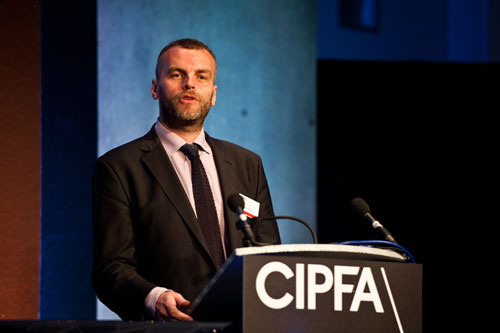By Mark Smulian | 11 July 2013
The High Speed 2 rail project should be scrapped and the money re-invested in a massive housebuilding drive, an influential Conservative commentator told the CIPFA conference.

Speaking in a debate on how fairness can be secured in the face of ongoing austerity, Tim Montgomerie, comment editor of the Times and former editor of the Conservative Home website, acknowledged that many people were affected by ‘rising prices, falling incomes and the lack of a safety cushion.
‘Wages for blue collar people have been stagnant or falling and prices facing poor people are rising faster than inflation’, he said. ‘It's true for too many people that the rich are getting richer and the poor poorer.’
But Montgomerie said austerity meant these problems could not be resolved by ‘turning on the spending taps again [as] the era of ever-expanding government is over because the British economy is growing too slowly to produce the tax revenues needed’.
The foundation of society should be ‘strong families, stable education and paid employment’, he said. Diverting money from HS2 to the construction of 80,000 affordable homes would encourage family stability.
He said the coalition had done too little to support growth and called for investment in vocational education – a field he described as Education Secretary Michael Gove’s ‘blind spot’ – more airport capacity, a ‘dash for gas’ and an industrial strategy for key sectors.
Owen Jones, a columnist with the Independent and author of the controversial book Chavs: the demonisation of the working class, told the conference that the very assumptions behind austerity were wrong.
‘Growth is being sucked out of the economy. By this point after the great depression we had recovered,’ Jones said.
He noted that even ratings agency Standard & Poors had acknowldged that fiscal austerity risked 'being self-defeating because it cuts growth and people’s willingness to spend'.
Jones ridiculed those who argued that state should be rolled back to allow the private sector to flourish, noting ‘market capitalism depends on the state for the defence of property rights, research and development, education and health care. It is no good running a business if your employees are dying of diseases.’
But Jones said he did favour the state ceasing what he called subsides to the private sector, such as Housing Benefit ‘which is subsidising landlords, and tax credits which are subsiding employers who pay too little’.
Derrick Anderson, chief executive of the London Borough of Lambeth, said he was an optimist about public services . ‘I resent the doomsayers,’ he said.
He predicted that technology would play a significant role in reducing the cost of services and demand for them, notably in adult social care, but admitted that since the revelations about US communications spying, ‘there will be issues of transparency and privacy with the Edward Snowden case and some will see the state as threatening and intrusive’.
Lambeth’s ‘co-operative council’ model was intended to set out what the state could do and what could be done by individuals, he said.
‘If we are to continue to deliver services we must see what we can do, see what people can do for themselves and how we can facilitate them to do that, that will allow services to continue to an acceptable standard,’ he said.
Answering questions, Anderson said he was against ring-fencing of any budgets because ‘it calcifies problems, and I am not interested in the service as such but in the outcome’.
Montgomerie told questioners that the older generation ‘did have things easier with free tuition and cheaper homes, and it’s right there should be an acknowledgment by older people of the need to help younger people who are struggling’.
He added: ‘The Left is too wedded to the public sector, and the Right is too wedded to the elderly because they are its core vote.’
But Jones said he deplored any attempt to stoke ‘generational tension’ by pitting the old and young against each other. ‘There are rich and poor in each generation, you can’t generalise,’ he said.
Follow all the debates and speakers from the CIPFA conference on Public Finance's live blog.





















